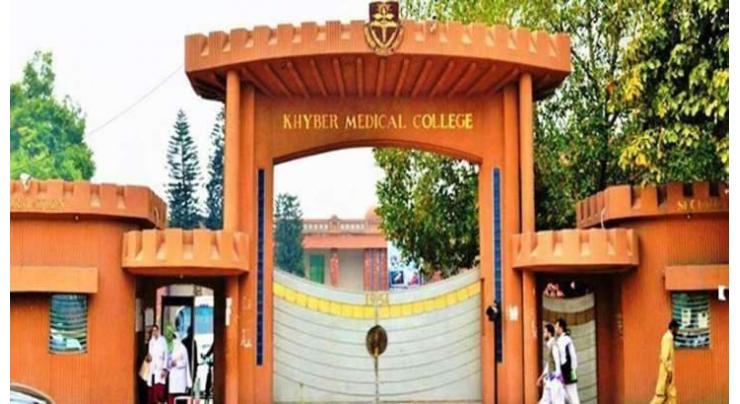
- Home
- Pakistan
- News
- Khyber Medical University Launches BiZiFED Project to Eliminate Zinc and Iron Deficiency
Khyber Medical University Launches BiZiFED Project To Eliminate Zinc And Iron Deficiency
Mohammad Ali (@ChaudhryMAli88) Published June 21, 2019 | 08:12 PM

Khyber Medical University (KMU) Peshawar with joint collaboration of various international and national partners launched BiZiFED Project to eliminate Zinc and Iron deficiency in Pakistan
According to a press release, the BiZiFED project aims to investigate traditional crop breeding techniques, coupled with the application of nutrient rich fertilizer to enrich wheat with essential nutrients such as zinc and iron, known as "Bio-fortification".
The outcomes of this research will provide valuable evidence for policy makers in Pakistan to guide decisions regarding the scaling up of Bio-fortification on a national level.
It is worth mentioning that BiZiFED is an interdisciplinary and collaborative project, including international experts in agriculture and food systems, human nutrition and social sciences from Pakistan and the UK from the Lead institution University of Central Lancashire (UCLan) and collaborative partners Khyber Medical University (KMU); Abaseen Foundation, Fauji Fertilizer Company (FFC); University of Nottingham (UoN); London school of Hygiene & Tropical Medicine (LSHTM); King's College London (KCL); and the British Geological Survey (BGS).
The BiZiFED project is supported by the Biotechnology and Biological Sciences Research Council (BBSRC) within the Global Challenges Research Fund (GCRF). GCRF is a 1.5 billion funding stream for challenge-led research from the UK Government Official Development Assistance (ODA) budget.
It is essential to share that dietary zinc deficiency is a global public health problem, affecting 17% of the world's population with the greatest burden in low and middle-income countries.
The most recent national nutrition survey in Pakistan indicated that over 40% of women were zinc deficient.
It is imperative for global health and prosperity that sustainable, cost-effective solutions to zinc deficiency are found.
The prevalence of zinc deficiency is greatest in poor and marginalised populations. These same populations are likely to grow or purchase wheat that is processed into flour at small-scale, local mills (known as chakkis). Up to 65% of wheat is processed at chakkis in Pakistan.
The BiZiFED project will determine the value of adding zinc fertilizers to wheat production in Pakistan, both in terms of yield and potential health benefits. This is important because the plant-available zinc concentration of most soils in Pakistan is very low compared to other parts of the world.
The agronomy surveys at 720 locations and 2880 sites of 36 Districts of Punjab and KP will provide information on the performance of Bio-fortified wheat on different soils and with different fertilizer management.
This is the first study to explore the socio-cultural acceptability of Bio-fortification in Pakistan. The findings will improve our understanding of factors that are likely to affect the sustainable uptake of Bio-fortified wheat.
Related Topics
Recent Stories

3 Gawadar attack victims funeral offered

Mbappe says he will leave PSG at end of season

Usmani felicitates Sardar Saleem on taking oath as Punjab Governor

DC for provision of facilities to people in Lasbela

Solar storm could bring auroras, power and telecoms disruptions

Court grants interim bail to PTI leaders

Ulema, Mashaykh call for political accountability, collaboration for Pakistan's ..

SHRC asks NADRA to issue CNICs to transgender as per law

Flash floods kill 50 in one day in north Afghanistan

CDA chief expresses commitment to promoting modern-day technologies

By wide margin, UN General Assembly votes to back Palestinian bid for membership ..

Musadik slams PTI's political approach as provocative
More Stories From Pakistan
-
LHC stops govt from distributing bikes among students till May 13
4 hours ago -
ECP refutes false reports on reserve seats reaction
5 hours ago -

3 Gawadar attack victims funeral offered
5 hours ago -

Usmani felicitates Sardar Saleem on taking oath as Punjab Governor
5 hours ago -

DC for provision of facilities to people in Lasbela
5 hours ago -

Court grants interim bail to PTI leaders
6 hours ago
-

Ulema, Mashaykh call for political accountability, collaboration for Pakistan's stability
6 hours ago -

SHRC asks NADRA to issue CNICs to transgender as per law
6 hours ago -

CDA chief expresses commitment to promoting modern-day technologies
5 hours ago -

Musadik slams PTI's political approach as provocative
5 hours ago -

Saudi Arabia to test flying taxis, drones this Hajj season: Minister
5 hours ago -

Governor for making comprehensive policy to protect universities from financial crisis
5 hours ago









